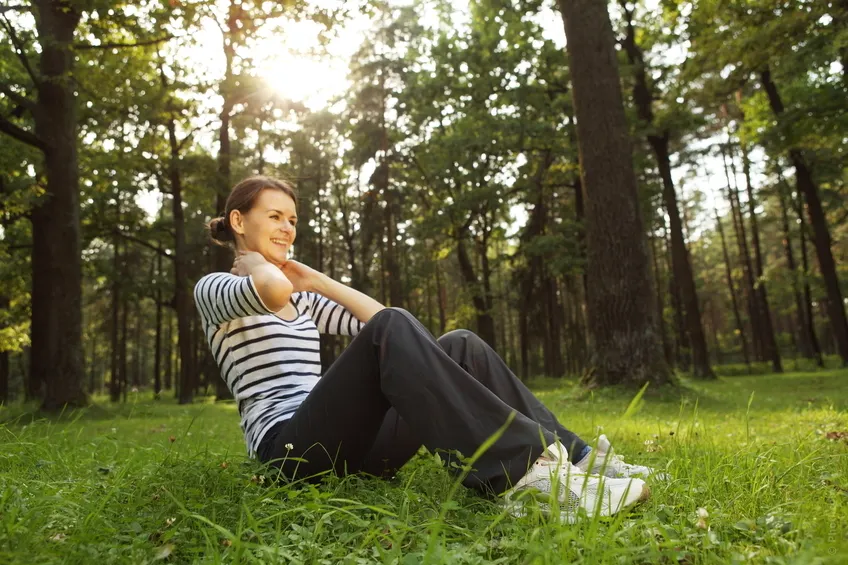6 Ways to Take Care of Your Body for Physical and Mental Balance


Reviewed and approved by the psychologist Bernardo Peña
For many years, it was thought that taking care of the body was simply a matter of consuming a certain type of nutrient-rich food or drink. Moreover, the body and mind were considered to be separate, with one having no influence on the other. However, thanks to much research and scientific evidence, it has been determined that there’s a stronger link between the two than previously thought.
Emotional problems have an impact on the body in the form of physical pain or discomfort, and vice versa. Knowing all this, medicine nowadays seeks to follow more oriental models, whose focus is to achieve a physical and mental balance with the aim of improving your overall quality of life.
In this sense, almost all health experts are advising to adopt a series of healthy habits and techniques that play a fundamental role in achieving such stability. Today, we’re going to share 6 methods to achieve taking care of your body.
1. Physical exercise

It’s no coincidence that this habit is number 1 on the list of ways to take care of the body. According to experts from the World Health Organization (WHO), physical activity is one of the best practices that can be done every day to lead a higher quality of life and above all a good physical and mental state.
With only 20 or 30 minutes of daily exercise, you can activate your whole body. This can help you to improve your circulation, strengthen your muscles, and protect your heart.
In addition, this is an excellent way to enjoy a good physical condition and maintain an adequate weight. This also prevents diseases associated with overweight and obesity. In addition to all this, the daily practice of a workout provides a great sense of well-being, as it stimulates the secretion of serotonin, often called the happiness hormone.
We think you may be interested in reading this, too: 5 Gestures That Happy Couples Do Before Going to Sleep
2. Acupuncture
Acupuncture is a method in which thin needles and heat applications are used to stimulate specific points on the body. The aim of this is to relieve certain types of discomfort and contribute to the well-being of the whole body.
It’s a very interesting technique that doesn’t intervene in the natural processes of the body. The application on each of the points only reaches the nerve fibers. This activates the flow and achieves a stability of energy that favors the body.
Acupuncture is based on the theory that considers the human body as a system of energy flows that, when balanced, can offer comfort both physically and emotionally.
It’s believed that this therapy can alleviate conditions associated with respiratory, neurological, and musculoskeletal processes.
3. A healthy diet

One of the basic factors in achieving whole-body stability is nutrition. Although we often don’t think about this, the nutrients in food have the capacity to strengthen the whole body on a physical level. In addition, they influence the breakdown and absorption of substances that determine the emotional state.
Eliminating junk food from our diets and adopting a healthy diet according to the needs of the body will even contribute to mental health.
4. Listening to the body
The body knows how to send us signals about its physical and emotional difficulties when the person is going through some of them. For instance, it’s very likely that you may l start to experience a series of symptoms and signs that warn you that something is not quite right all of a sudden.
To avoid the development of even bigger problems, it’s essential to learn to listen to what our bodies want to tell us in order to attend to them in a timely manner.
5. Aromatherapy
Aromatherapy is a relaxation technique that, according to some, could also help to take care of the body. It’s based on the use of the aromas and properties of some plants. Therefore, it works through the essential oils that are extracted by processing.
The aromas they release provide a certain sense of harmony and contribute to relaxation. Thus, it’s considered to have a direct influence on our emotional and physiological well-being.
Like this article? You may also like to read: 5 Tricks to Be Happy and Healthy During Menopause
6. Practicing yoga is great to take care of your body

Yoga is an ancient discipline that originated in India. Practicing yoga serves to exercise the mind and take care of the body, and achieve stability. It’s based on moral guidelines that call for self-discipline, calm, respect, and sincerity with oneself and with others.
There are different ways of practicing it, depending on its origin and your goals. In general, they all aim to strengthen the mind’s ability to influence bodily functions. According to MedlinePlus experts, yoga is a discipline that can contribute to health in several aspects, since it not only helps to take care of the body. In fact, its practice helps:
- Improve coordination
- Reduce anxiety, depression, and stress
- Reduce heart rate and blood pressure
- Improve self-confidence, among other things
To take care of your body, it’s necessary to maintain a whole healthy and active lifestyle, not only to practice a discipline or smell the aroma of a candle scented with lavender or eucalyptus. Keep in mind that the body is a complex structure and, as such, it requires many different healthy practices to stay healthy.
Finally, don’t forget that a healthy body is a body that can achieve well-being, stability, and emotional tranquility.
All cited sources were thoroughly reviewed by our team to ensure their quality, reliability, currency, and validity. The bibliography of this article was considered reliable and of academic or scientific accuracy.
- Neumeister A. (2003). Tryptophan depletion, serotonin, and depression: Where do we stand?. http://europepmc.org/abstract/med/15131521
- Nautifayl KM, et al. (2016). A lack of serotonin 1B autoreceptors results in decreased anxiety and depression-related behaviors. https://www.ncbi.nlm.nih.gov/pubmed/27353308
- Ziment, I. (2000). Recent advances in alternative therapies. Current Opinion in Pulmonary Medicine. https://doi.org/10.1097/00063198-200001000-00013
- Ali, B., Al-Wabel, N. A., Shams, S., Ahamad, A., Khan, S. A., & Anwar, F. (2015). Essential oils used in aromatherapy: A systemic review. Asian Pacific Journal of Tropical Biomedicine. https://doi.org/10.1016/j.apjtb.2015.05.007
This text is provided for informational purposes only and does not replace consultation with a professional. If in doubt, consult your specialist.








